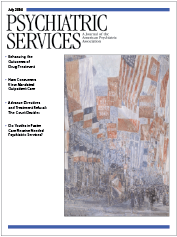Predictors of the Stage of Residential Planning Among Aging Families of Adults With Severe Mental Illness
Abstract
OBJECTIVE: This study identified predictors of the extent of residential planning carried out by aging families of adults with severe mental illness according to the conceptual framework of the Double ABCX model of family coping and adaptation. METHODS: Mail surveys were completed by 157 mothers (mean age, 67 years) from 41 states who lived with and provided care to offspring with serious mental disorders (mean age, 38 years). Seventy-six percent of the offspring were men (N=120). Sixty percent of the offspring had been given a diagnosis of schizophrenia or schizoaffective disorder (N=94), 20 percent had multiple diagnoses (N=31), and 16 percent had bipolar disorder (N=25). RESULTS: Higher stages of planning were associated with use of avoidance as a means of coping, discussion of plans with the offspring with a disability, the desire to have family members assume future care responsibilities, lower subjective burden of providing care, and more self-perceived adverse age-related change. The model accounted for 20 percent of the variance in residential planning; over half of this variance was associated with coping behaviors and appraisals of the caregiving context. CONCLUSIONS: In addition to providing relevant information and alleviating feelings of intense burden that undermine residential planning, service providers can best assist older parents by encouraging them to recognize age-related changes in themselves that signal the need to plan and by helping them to involve the entire family in the planning process.



